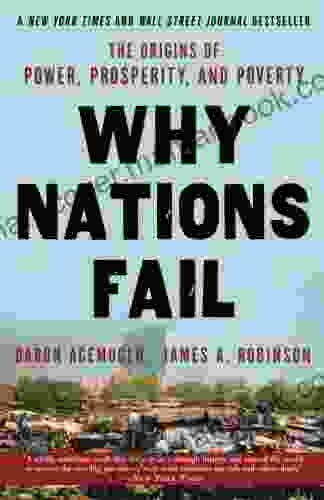The Origins of Power, Prosperity, and Poverty: A Comprehensive Exploration

The contrasting realities of power, prosperity, and poverty have perplexed humankind throughout history. Understanding their origins is not just an academic pursuit but a crucial step towards addressing the pressing challenges facing our societies. This article delves deep into the complex interplay of socioeconomic factors, historical events, cultural influences, political structures, and economic systems that have shaped the distribution of power, wealth, and social well-being.
Socioeconomic Factors
- Class Structure: Societal hierarchies based on economic status, education, occupation, and social connections have historically determined access to power and resources.
- Income Distribution: The unequal distribution of income and wealth creates disparities in opportunity and social mobility, reinforcing socioeconomic inequalities.
- Labor Market Dynamics: The nature of employment, wages, and working conditions significantly influences the economic security and well-being of individuals and families.
- Education and Skills: Access to quality education and the acquisition of skills are fundamental factors in determining economic opportunities and upward social mobility.
- Health and Well-being: Health, nutrition, and access to healthcare impact an individual's ability to work, participate in society, and contribute to economic growth.
Historical Context
4.5 out of 5
| Language | : | English |
| File size | : | 16591 KB |
| Text-to-Speech | : | Enabled |
| Screen Reader | : | Supported |
| Enhanced typesetting | : | Enabled |
| X-Ray | : | Enabled |
| Word Wise | : | Enabled |
| Print length | : | 546 pages |
- Colonialism and Imperialism: The exploitation of colonies and indigenous populations by European powers led to the accumulation of wealth and power in the hands of the colonizers, while impoverishing vast populations.
- Industrial Revolution: The rise of industrial capitalism transformed societies, creating new opportunities for economic growth and social mobility, but also exacerbating inequalities and labor exploitation.
- World Wars: The devastating conflicts of the 20th century led to massive loss of life, political and economic upheaval, and the rise of new global powers.
Cultural Influences
- Power Dynamics: Cultures vary in their acceptance and legitimization of hierarchical structures, influencing the distribution of power and control.
- Wealth Accumulation: Cultural norms regarding thrift, investment, and consumption patterns impact how individuals and societies accumulate and distribute wealth.
- Social Mobility: Cultural beliefs about social stratification and the possibility of upward mobility affect individuals' aspirations and opportunities.
Political Structures
- Forms of Government: Different government structures, such as democracies, autocracies, or oligarchies, have varying degrees of citizen participation and power distribution.
- Political Ideologies: Ideological beliefs about the role of government, individual rights, and economic systems influence policies that affect power and prosperity.
- Political Corruption: Corruption and the abuse of power can undermine economic development and social justice.
Economic Systems
- Capitalism: Market-based economies driven by private ownership, profit-seeking, and competition, with varying degrees of government intervention.
- Socialism: Economies characterized by collective ownership of the means of production, government control over economic activities, and a commitment to social welfare.
- Mixed Economies: Hybrid systems that combine elements of both capitalism and socialism, balancing individual incentives with government regulation and social safety nets.
Social Justice
The pursuit of power, prosperity, and poverty reduction cannot be separated from the broader goal of social justice.
- Equity and Equality: Ensuring fair and just opportunities for all members of society, addressing disparities in access to resources and social benefits.
- Human Rights: Protecting fundamental rights and freedoms, such as access to education, healthcare, and political participation, is essential for creating a just and equitable society.
- Social Mobility: Promoting opportunities for upward social mobility through education, skills development, and access to decent work is crucial for breaking cycles of poverty.
Bridging the Gap
Addressing the origins of power, prosperity, and poverty requires a multifaceted approach that involves:
- Economic Policies: Implementing progressive tax policies, investing in education and infrastructure, and promoting job creation to reduce income inequality and foster economic growth.
- Social Programs: Providing social safety nets, such as healthcare, unemployment insurance, and affordable housing, to protect vulnerable populations and reduce poverty.
- Political Reform: Promoting democratic governance, strengthening anti-corruption measures, and increasing citizen participation in decision-making.
- Cultural Transformation: Challenging stereotypes, promoting inclusivity, and fostering a culture that values social justice and equitable opportunities.
- International Cooperation: Addressing global economic imbalances, promoting fair trade, and providing development assistance to countries facing poverty.
The origins of power, prosperity, and poverty are deeply intertwined and influenced by a complex web of socioeconomic, historical, cultural, political, and economic factors. Understanding these origins is the first step towards developing effective strategies to create fairer and more equitable societies. By embracing social justice, implementing progressive policies, and fostering a culture of inclusivity and opportunity, we can bridge the gap between power and prosperity, and ensure that all members of society have the chance to achieve a fulfilling and prosperous life.
4.5 out of 5
| Language | : | English |
| File size | : | 16591 KB |
| Text-to-Speech | : | Enabled |
| Screen Reader | : | Supported |
| Enhanced typesetting | : | Enabled |
| X-Ray | : | Enabled |
| Word Wise | : | Enabled |
| Print length | : | 546 pages |
Do you want to contribute by writing guest posts on this blog?
Please contact us and send us a resume of previous articles that you have written.
 Top Book
Top Book Novel
Novel Fiction
Fiction Nonfiction
Nonfiction Literature
Literature Paperback
Paperback Hardcover
Hardcover E-book
E-book Audiobook
Audiobook Bestseller
Bestseller Classic
Classic Mystery
Mystery Thriller
Thriller Romance
Romance Fantasy
Fantasy Science Fiction
Science Fiction Biography
Biography Memoir
Memoir Autobiography
Autobiography Poetry
Poetry Drama
Drama Historical Fiction
Historical Fiction Self-help
Self-help Young Adult
Young Adult Childrens Books
Childrens Books Graphic Novel
Graphic Novel Anthology
Anthology Series
Series Encyclopedia
Encyclopedia Reference
Reference Guidebook
Guidebook Textbook
Textbook Workbook
Workbook Journal
Journal Diary
Diary Manuscript
Manuscript Folio
Folio Pulp Fiction
Pulp Fiction Short Stories
Short Stories Fairy Tales
Fairy Tales Fables
Fables Mythology
Mythology Philosophy
Philosophy Religion
Religion Spirituality
Spirituality Essays
Essays Critique
Critique Commentary
Commentary Glossary
Glossary Bibliography
Bibliography Index
Index Table of Contents
Table of Contents Preface
Preface Introduction
Introduction Foreword
Foreword Afterword
Afterword Appendices
Appendices Annotations
Annotations Footnotes
Footnotes Epilogue
Epilogue Prologue
Prologue Miyamoto Musashi
Miyamoto Musashi Stephen Crane
Stephen Crane Duane L Herrmann
Duane L Herrmann Cameron Gordon
Cameron Gordon Emily Ryan
Emily Ryan Paul Vidich
Paul Vidich Peter Clarke
Peter Clarke Raven Mcallan
Raven Mcallan Evan Hundhausen
Evan Hundhausen Ed Back
Ed Back Lemn Sissay
Lemn Sissay Monae Everett
Monae Everett Taste Of Home
Taste Of Home Charles R Miller
Charles R Miller Joel Stern
Joel Stern Kiki Prottsman
Kiki Prottsman Jean Pierre Bellon
Jean Pierre Bellon David The Good
David The Good Ernest Small
Ernest Small David Stotelmyre
David Stotelmyre
Light bulbAdvertise smarter! Our strategic ad space ensures maximum exposure. Reserve your spot today!
 Garrett BellFollow ·5.1k
Garrett BellFollow ·5.1k Enrique BlairFollow ·5.2k
Enrique BlairFollow ·5.2k George OrwellFollow ·5.2k
George OrwellFollow ·5.2k Clarence BrooksFollow ·17.9k
Clarence BrooksFollow ·17.9k Samuel BeckettFollow ·11.6k
Samuel BeckettFollow ·11.6k Marcel ProustFollow ·13.1k
Marcel ProustFollow ·13.1k Steve CarterFollow ·4.7k
Steve CarterFollow ·4.7k Diego BlairFollow ·10.3k
Diego BlairFollow ·10.3k

 Eugene Powell
Eugene PowellComplete Guide to Using Yoga With Kids: Benefits, Tips,...
Yoga is an ancient practice that has been...

 Benji Powell
Benji PowellHow to Make $000 Per Week on Craigslist
Are you looking for a way to make extra money...

 Gabriel Garcia Marquez
Gabriel Garcia MarquezGrocery Row Gardening: The Exciting New Permaculture...
Kick-start your gardening journey with the...

 Hayden Mitchell
Hayden MitchellUnveiling the Gripping World of Winterwood: Ben Hood...
In the annals of crime thrillers, the...

 E.M. Forster
E.M. ForsterThe Financial Advisor Guide To Managing and Investing...
As a financial...

 Lee Simmons
Lee SimmonsIn My Shoes Memoir: A Poignant Journey of Resilience,...
In the tapestry of life, adversity often...
4.5 out of 5
| Language | : | English |
| File size | : | 16591 KB |
| Text-to-Speech | : | Enabled |
| Screen Reader | : | Supported |
| Enhanced typesetting | : | Enabled |
| X-Ray | : | Enabled |
| Word Wise | : | Enabled |
| Print length | : | 546 pages |












